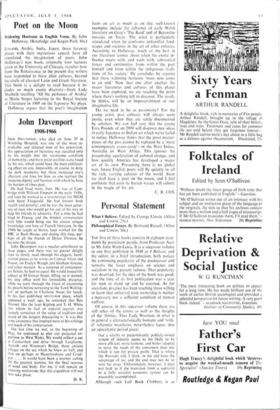Poet on the Moon
Widening Horizons in English Verse. By John Holloway. (Routledge and Kegan Paul, 16s.) ICELAND, Arabia, India, Japan, those faraway places with their mysterious appeal, have all stimulated the imagination of poets. John Holloway's new book, originally four lectures given at the University of Chicago, sketches how from the Renaissance to the present day writers have responded to these alien cultures, beyond the circle of classical Latin and Greek literature. This book is a delight to read because it in- cludes so much exotic diversity—from Lady Macbeth recalling 'All the perfumes of Arabia' to Marie Scopes lecturing to the Royal Society of Literature in 1909 on the Japanese No plays.
Holloway argues that the poet's imagination
feeds on art as much as on life; well-known examples include the influence of early Welsh literature on Gray's 'The Bard' and of Byzantine mosaics on Yeats. The artist is particularly stimulated when he confronts unfamiliar land- scapes and societies in the art of other cultures. According to Holloway. much of the best in our literature 'comes about when the exotic in- fluence meets with, and weds with, substantial forces and continuities from.. within the poet himself and from within the indigenous tradi- tions of his society.' He concludes by arguing that these widening horizons 'must now come to an end.' Now that one after another the major literatures and cultures of this planet have been explored, we are reaching the point where there's nothing left to discover. The result, he thinks, will be an impoverishment of our imaginative life.
Do we need to be so pessimistic? For the young artist, past cultures will always seem exotic, even when they are safely documented by scholars. We can feel sure that the young Ezra Pounds of AD 2000 will discover new ideas in early Japanese or Indian art which we've failed to notice. Holloway thinks that the great master- pieces of the past cannot be replaced by a 'mere contemporary avant-garde'—in the West Indies, Australia or West Africa. This ignores the present-day acceleration of cultural change, and how quickly America has developed a major art of its own. Presuming there is no global war, future English poets will fly quickly to all the rich, varying cultures of the world. Soon we shall have a poet on the moon, and I feel confident that even its barren wastes will submit to the magic of his art.
C. B. COX






























 Previous page
Previous page